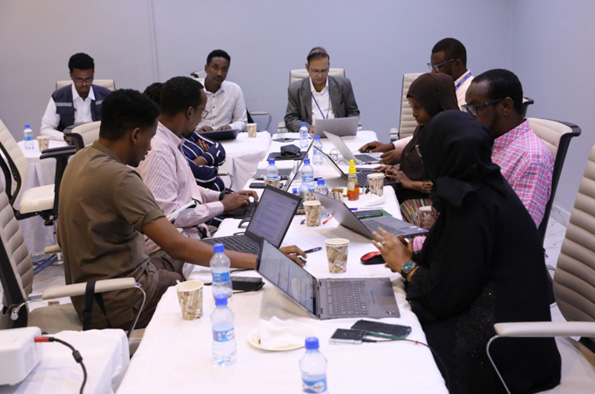 Dr Uday Raj Naidu Canchi Bhoopal (pictured in the middle), a WHO subnational Health Cluster coordinator, joins the Health Cluster strategic advisory group in a humanitarian fund allocation review exercise for partners in Jubaland. Photo credit: WHO/WHO Somalia3 July 2024, Mogadishu, Somalia – Ms Fatima Abdirazak Ahmed joined WHO in Somalia at the beginning of 2024 as a subnational Health Cluster coordinator in Hirshabelle state. Having just finished a meeting with 15 Health Cluster partners, she heads to the office of Hirshabelle State Ministry of Health. Here, she will brief and discuss with the Director-General the ongoing efforts of the Health Cluster to reach vulnerable and underserved communities with health services during the measles and cholera outbreaks across the state. Health Cluster partners thus play a crucial role in the collection and reporting of disease surveillance data.
Dr Uday Raj Naidu Canchi Bhoopal (pictured in the middle), a WHO subnational Health Cluster coordinator, joins the Health Cluster strategic advisory group in a humanitarian fund allocation review exercise for partners in Jubaland. Photo credit: WHO/WHO Somalia3 July 2024, Mogadishu, Somalia – Ms Fatima Abdirazak Ahmed joined WHO in Somalia at the beginning of 2024 as a subnational Health Cluster coordinator in Hirshabelle state. Having just finished a meeting with 15 Health Cluster partners, she heads to the office of Hirshabelle State Ministry of Health. Here, she will brief and discuss with the Director-General the ongoing efforts of the Health Cluster to reach vulnerable and underserved communities with health services during the measles and cholera outbreaks across the state. Health Cluster partners thus play a crucial role in the collection and reporting of disease surveillance data.
Dr Uday Raj Naidu Canchi Bhoopal is a subnational Health Cluster coordinator based in Kismayo, Jubaland. He leads regular Health Cluster meetings to coordinate partners’ actions on humanitarian response, from provision of supplies to service delivery, particularly for measles and cholera outbreak response. He also coordinates critical training for Health Cluster partners. Recently, he facilitated training for 12 health professionals, from various health facilities, on clinical management of severe acute malnutrition with medical complications, and cholera case management. The latter gave health workers the knowledge and practical skills to manage cholera cases appropriately and promote infection prevention and control in cholera treatment units in line with globally recognized practices and protocols.
Along with Fatima and Naidu, 5 more state-level Health Cluster coordinators are deployed across Somalia to ensure subnational coordination among partners and with state ministries of health. These subnational Health Cluster coordinators play a pivotal role in emergency response – for example, understanding demand and coordinating the provision of essential supplies – and in health system strengthening. For instance, they promote the use of the Somalia Essential Package of Health Services (EPHS) as a harmonized standard for health service delivery and outbreak response efforts.
Importantly, the Health Cluster coordinators also work with the other clusters, including the Food Security, Nutrition, WASH (Water, Sanitation and Hygiene) and Protection clusters. This coordination enables integrated responses to people in need of humanitarian assistance.
In Somalia, the Health Cluster comprises 81 partners: 28 international non-governmental organizations (NGOs), 42 national NGOs, 4 United Nations agencies, 3 donors, 3 observers and a single national authority. It is co-led by WHO and Save the Children.
Initially, only the national-level Health Cluster Coordination structure was in place. WHO was able to recruit 7 subnational Health Cluster coordinators (4 international and 3 national staff) thanks to funding support from the United States Agency for International Development (USAID) Bureau for Humanitarian Assistance (BHA). Having a well-functioning subnational Health Cluster structure supports operational coordination much closer to the affected population and better adapted to its specific needs, enabling true localization.
Since the subnational Health Cluster coordinators were deployed, the regular Health Cluster coordination meetings have fostered stronger coordination and collaboration among health actors. The impact of the new coordinators’ efforts was showcased at a recent meeting of the Somalia Health Partner Group (SHPG). At the meeting, Erna van Goor, National Health Cluster Coordinator, based in Mogadishu, presented to the donors and partners illustrative maps produced and monitored by the Health Cluster. These maps show the locations and functionality of health facilities and current availability of health services across the country. This presentation vividly demonstrated the complexities and triumphs of the work of the Health Cluster and its coordinators, which was highly valued by humanitarian and development actors for their essential role in preventing duplication of efforts, monitoring service availability and quality, and addressing the health needs of the most vulnerable populations.
For more information, please contact
Erna van Goor, National Health Cluster Coordinator, WHO Somalia
Email:
Madinur Saydahmat, Partnerships Officer, WHO Somalia
Email:


